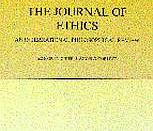Ethics may be defined as the principles and standards that underlie one's responsibilities and conduct. It covers the analysis and employment of concepts such as right, wrong and good and evil. Ethics is divided into three primary areas; meta-ethics (the study of the concept of ethics), normative ethics (the study of how to determine ethical values), and applied ethics (the study of the use of ethical values). This paper focuses on 'applied ethics'. This, by definition is the application of moral philosophy to actual problems in a particular set of circumstances, including those in Academia.
The great debate exists, whether or not ethics needs to be dealt with in an academic environment. One school of thought is that individuals have their own belief systems and will act according to what they believe anyway. Yet another, believes that since "institutions of higher education that live the ethics and values contained in their mission statements produce graduates who are highly valued and sought by ethical organizations."
(Procario-Foley and Bean, 2002:101).
The question then becomes, "Who should teach ethics, when and how?" (McDonald, G, 2006). According to Klein's 1998 article, the one condition necessary for a business ethics course is that the teacher must be a philosopher. He argues that philosophers are best qualified to teach ethics by virtue of their expertise in ethical theory (Klein 1998). This view of course, has been challenged by many others. (Raisner,1977), (Giacalone and Knouse, 1977), Frederick (1998), and (Park, 1998) have all critiqued the a-contextual nature of some business ethics teaching (Wilcox, 1999). It has been argued that in order to teach business ethics successfully, one must address both the ethical theory as well as the structure and context, unique to making that ethical decision. Some schools have academic institutions have tried to create an ethical...


